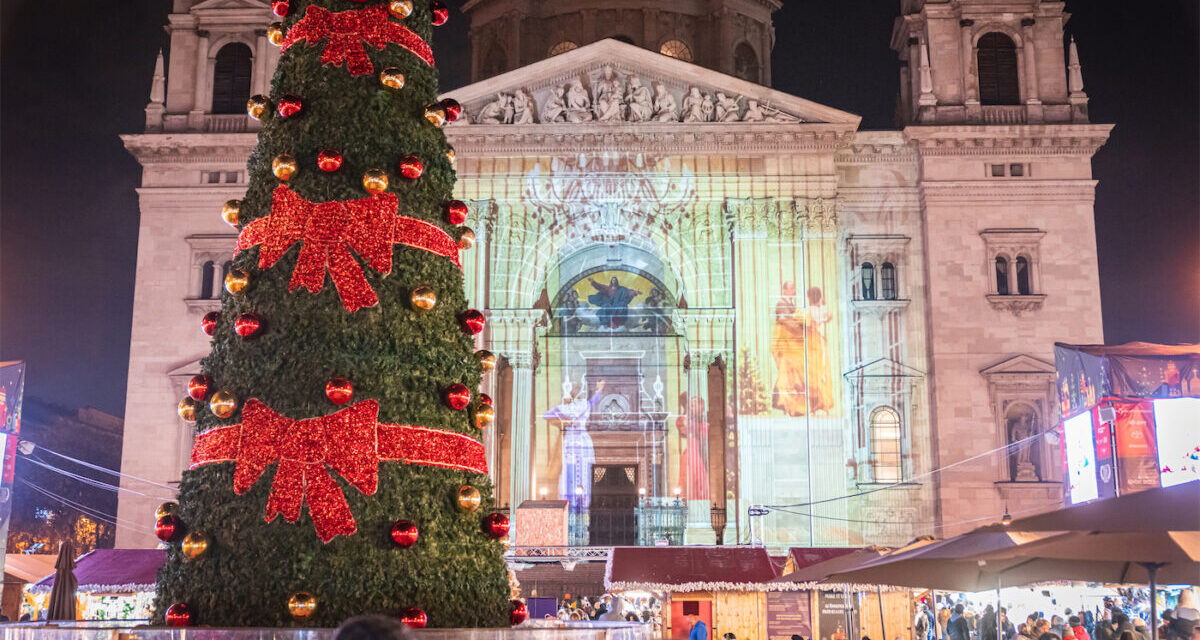Budapest hosts "the best European Christmas market of all time."
In 2023, the event in front of the Basilica of Szent István tér in Budapest became the best European Christmas market for the fourth time in a row, and this year it was awarded the title of "Best European Christmas Market of All Time" by European Best Destinations.
The Christmas market is a cultural and retail event that creates recreational value, that is, it creates an opportunity for visitors to relax. As an international research draws attention to, the main reason for participating in the Christmas market is to relax, experience the Christmas atmosphere, spend time with family and friends, and try and taste local products.
Christmas markets have many economic effects, so they are of growing importance in the tourism sector, among other things.
After becoming the best European Christmas market for the fourth time in a row in 2023, the event in front of the Basilica in Budapest's Szent István tér was this year awarded the title of "best European Christmas market of all time" by European Best Destinations
- indicated Viktória Németh, analyst of the Oeconomus Economic Research Foundation. He noted that the list of the most popular fairs differs from the most visited.
At the same time, the largest Advent fairs in Hungary are in an exceptional position and were also ranked among the fairs with the highest number of visitors, as stated by several sources, including EnjoyTravel's 2022 collection covering 50 cities.
Starting from the end of November, in many places in Europe, the cities are decorated with festive lights, the streets are lined with stalls, visitors can taste local food, traditional seasonal delicacies and buy handicrafts in the cozy squares.
At the larger European fairs, other attractions are available in addition to the Christmas fairs, such as sightseeing tours, ferris wheels and ice rinks to enhance the visitor experience.
In addition to this wide range of services, Christmas markets can also have an impact on the economy surrounding them, Viktória Németh pointed out. He listed that sales increase during the fairs, as well as strengthening community engagement and also contributing to the retail sector of European locations.
The expert reminded that the history of Advent fairs goes back to the Middle Ages, as they were first established in the German-speaking areas of Europe. The tradition started in the territory of the German-Roman Empire, and in this way, seasonal markets were among the first to spread not only in German-speaking countries, but also in the eastern region of France. However, it only became a popular Advent custom during the Reformation.
Christmas markets create a sense of community and a festive atmosphere, attracting nearby residents and families.
A community atmosphere encourages social interactions and local engagement. "It's a sense of community in supporting local businesses and can help strengthen the local economy if parking, crowd and traffic issues are properly addressed," the expert believes.
One important element of the spillover effects of holiday fairs is the increasing foot traffic, the growth of which is beneficial for nearby commercial units, especially shops, restaurants and cafes, which may also be important in terms of recovering from the economic difficulties that have appeared internationally in recent years.
Increased footfall often leads to higher sales and increased awareness, resulting in a positive ripple effect for nearby businesses
- emphasized Németh, adding that Christmas markets often favor local and small businesses, providing them with a platform to present their products and services. Holiday fairs help local businesses expand their customer base and increase brand awareness.
All of these factors can also have a stimulating effect on the commercial real estate sector, in the immediate vicinity of the Christmas markets.
In the United Kingdom, a survey was conducted on the impact of Christmas markets on local communities and how they contribute to the economic well-being of cities.
The research looked at a wide range of Christmas markets, from two-day events in small towns to huge multi-week venues in major city centres, and found the following:
- over the years, Christmas markets contribute more and more to the economic well-being of the host city,
- they can be key tools in marketing and promotion to increase the number of visitors,
- they also allow the host city to improve its attractiveness and compete more effectively for the public.
Some of the key economic benefits of holiday markets are the income generated for the area, the increase in visitor numbers and the number of jobs created. Accordingly, the number of locations in the UK increased from an estimated 30 to over 100 markets from 2007 to 2017, and the number of days and hours they were open also increased.
The employment also covers those who participate in the construction of the stands, servicing, maintaining security, cleaning the site, waste management, and promotion.
According to a survey conducted in the United States, for many of the retailers and craftsmen, the last six weeks of the year bring up to 50 percent of the turnover, explained the expert of Oeconomus. However, the costs associated with Christmas shopping are also significant for vendors, just think of festival staff wages or rental costs. At the same time, the listed factors also point out that Christmas markets affect several sectors of the economy and also play a role in the seasonal expansion of employment.
Christmas markets attract a much wider demographic than the usual trade at local markets, thus attracting new customers of all ages and cultures to the festive markets.
Many visitors see Christmas markets as a leisure experience rather than a shopping experience, and comparisons of European Christmas markets are becoming more frequent in the media and in various internet polls.
- pointed out Németh, who says that the popularity of the events is also shown by the continuous increase in the number of social trips organized to visit Christmas markets, as well as the growing seasonal offer of travel agencies. Overall, Christmas markets are a big attraction for tourists.
"At the same time, it is also worth considering that not all local residents are happy about the increase in tourism. The so-called overtourism, or in Hungarian, overtourism, makes life difficult for the population in many places," the expert noted.
After becoming the best European Christmas market for the fourth time in a row in 2023, the landing in front of the Basilica of Szent István tér in Budapest was awarded the title of "Best European Christmas Market of All Time" by European Best Destinations this year. The capital also featured in the ranking of fairs with the largest number of visitors.
Based on the 2022 data, it belonged to the middle field with its 800,000 visitors, as shown by several sources, including EnjoyTravel's 50-city collection.
"In terms of the number of guests in our region, the Hungarian capital was only surpassed by Vienna, which is also in a privileged position from the point of view of international tourism, while the number of visitors to the Budapest fairs surpasses the 300,000 visitors of Prague, which is also important from the point of view of tourism," explained Németh.
From a domestic perspective, it is also worth noting that, in addition to the Advent fairs located in Budapest's Vörösmarty Square, in front of the Basilica, or in the Budavári Palace District, many rural Christmas markets are also ranked among the most beautiful by domestic internet portals, including those in Győr, Szeged, Eger, Pécs, Miskolc , as well as events in Szentendré, Esztergom and Vác were also included in the recommendations.
Cover photo: The most beautiful Christmas market of all time in Budapest
Source: adventbazilika.hu













